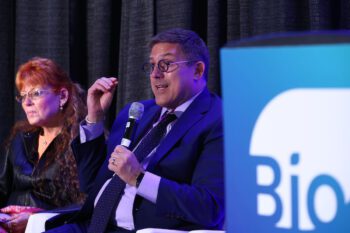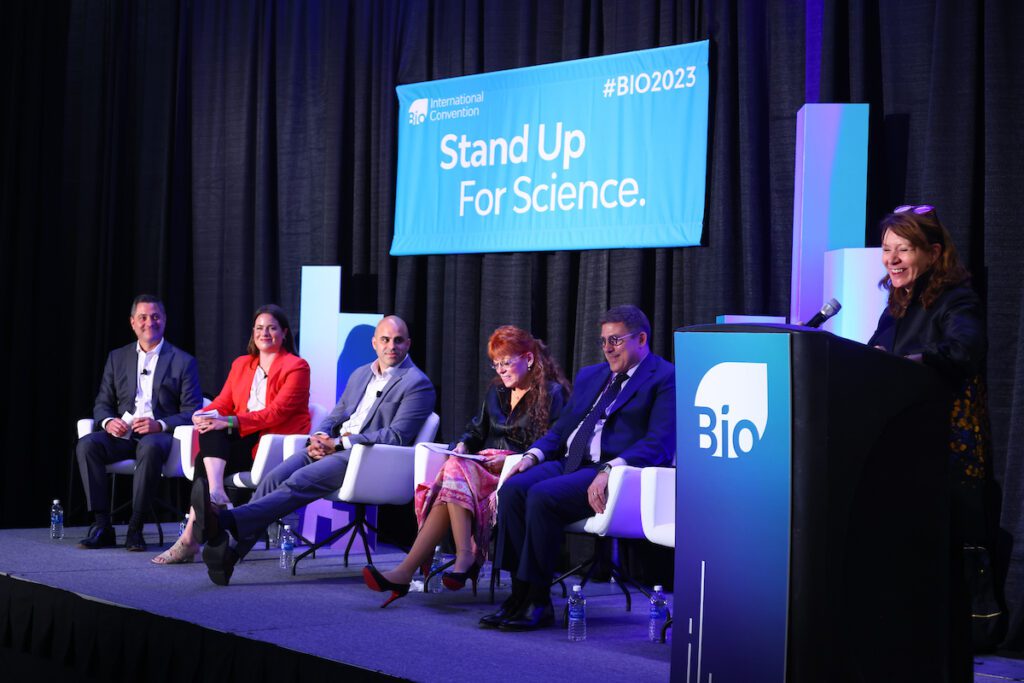Patient stories and relationships are at the heart of state advocacy.
“A lot of policymakers are just not aware of what our companies are, and they may have distorted viewpoints about what we do,” said Kathy Sherman, Executive Director, State & International Government Affairs at Amgen, during a panel called Business Critical: Building a State/Regional Advocacy Arm. “But hearing the stories of patients, the trade associations, and companies at the state level are key for change. That’s why we’re here today, and that’s what’s important.”
Speaking at the 2023 Biotechnology Innovation Organization (BIO) International Convention, government affairs professionals, patients, and politicians all agreed that state policy works better when legislators are informed and impacted.
“I stand before you today, not only as a passionate advocate for the biotech industry, but also as a cancer survivor,” said Susan Moran, Massachusetts State Senator for the Plymouth and Barnstable District. “My personal journey through the complexities of this disease has reinforced my belief in the critical role that legislative advocacy plays in improving patient outcomes and ensuring access to new and existing forms of treatment.”
“I wasn’t born an advocate,” said Kathleen Arntsen, President & CEO of the Lupus and Allied Diseases Association, Inc. “I experienced a life-altering event that saw my hopes, dreams, and aspirations to have a career and financial security disappear. So I was left having to reinvent myself or have a pity party. But even though I wasn’t born to be an advocate, I love what I do, and I hope to do it for a lot longer.”
And when it comes to state policy, the wheels of the legislature move a bit faster, which can provide unique challenges—and opportunities.
Working with state legislatures? Keep on your toes.

Be prepared for the speed of state legislation, said Patrick Plues, Vice President SGA, Government Affairs and External Relations at BIO.
“You could have a bill introduced on a Monday, and it could get to the governor’s desk by Friday. So, you really have to be prepared to have your points in order and then be able to pivot if something goes sour,” he said.
However, “compared to the federal side,” Plues noted, “you have a lot of interaction with the actual policymakers, and you also deal with staff to some degree. This is what I love about state affairs. Many of my federal colleagues are very envious of us, because we have personal relationships with all the legislators that we deal with.”
“I don’t have a medical background,” added Meghan Kilcoyne, Massachusetts State Representative of the Worcester District. “Government relations and lobbyists play a critical role in working with us directly, and many of them have personal relationships with me or with my colleagues to make sure that we understand what’s going on. They can take a very complex issue and distill it in a way that we can understand and then we can communicate that back to our constituents or stakeholders if necessary.”
And this year, like every year, has shown just how important one-on-one relationships in the state legislature are—this time in the form of biomarker testing legislation.
Biomarker testing in the states
Biomarker testing “is a way to look for genes, proteins, and other substances (called biomarkers or tumor markers) that can provide information about cancer. Each person’s cancer has a unique pattern of biomarkers. Some biomarkers affect how certain cancer treatments work,” explains the National Cancer Institute.
Far too few patients have access to this profound technology due to gaps in Medicaid or private insurance coverage. Yet, there is movement to change that to some degree on the state level—a small step for what requires a huge leap.
“When it comes to biomarker testing bills, state legislatures are currently the only game in town,” said Marc Hymovitz, Director of Government Relations at the American Cancer Society Cancer Action Network.
“We’ve all seen what’s happening on the federal level—or rather, what’s not happening at the federal level—so it’s important that states aren’t waiting around. They’re passing policies that will help patients, especially when it comes to the biomarker testing bills. In the last year and a half to two years, we’re up to about 12 states that pass comprehensive biomarker testing. And while that is great for patients in those 12 states, but there are still 38 other states that lack coverage. This is where the federal legislature needs to pick up on what the states have started,” continued Hymovitz.
“My background in biomarkers stems from the understanding that everybody in my family or in my district has been impacted by cancer or disease,” said Rep. Kilcoyne. “I was really excited to get involved in the biomarker testing work.”
Because of Rep. Kilcoyne’s relationship with state government relations professionals like Hymovitz, she was able to connect with her community in a new way. She soon found that her constituents were not only supportive, but also grateful. Many of them had faced the need for biomarker testing, and the challenges therein.
This brought the conversation back to its original point: by connecting one-on-one with legislators, state policy experts help save patient lives.




